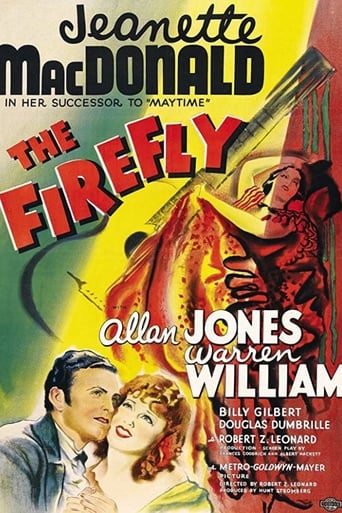

Jeannette MacDonald and Allan Jones star with Warren William in "The Firefly," a 1937 MGM film.MacDonald plays Nina Maria Azara, a singer, who is also a spy for Spain during the Napoleonic Wars. She is to seduce French officers and find out Napoleon's plans for Spain.She meets Don Diego, who pursues her while she is working as a singer. She has to stave him off in order to meet with those who can give her information, among them Major de Rouchemont (William).Don Diego keeps showing up, including on her trip to Bayonne. There, the famous Donkey Serenade is introduced. Unknown to her, Don Diego is actually Captain Andre, who is sent to Spain to spy on her.The story is a backdrop for all of the music, and there is a ton of it. MacDonald's voice was highly touted; with today's ears, it was a lovely voice, particularly in the middle, but I was never crazy about her top notes. I think it was just the way women were trained by then. She was a beautiful woman and a fine, fiery actress, and her popularity was well deserved. She does a good job here.Allan Jones was not the most sparkling presence -- he certainly was no match for MacDonald in that department -- but he truly had a beautiful voice. Warren William was very good in a villainous role.Most of the music was written by Rudolf Friml and Herbert Stothart, so you need to like operetta in order to like this film, and also classical voices.
... View MoreFrance and England are at war. Napoleon has placed troops in Spain "to protect the Spanish" in case England invades.There is a beautiful cantina singer (and dancer!) named Nina Maria (Jeanette MacDonald) whom men fight over. She works as a spy for Spain. When Napoleon invites Ferdinand--who appears guileless--to France for a meeting, Nina Maria must leave for France immediately to determine if Napoleon's intentions are honorable.She is pursued there by Don Diego (Allan Jones), a man smitten by the senorita. Along the way, he tries to charm her by singing "The Donkey Serenade"--one of the most memorable moments in the film.When they arrive in Bayonne, France, things get complicated. The senorita discovers someone is on to her. The love story becomes more political as Nina Maria must make alliances based on trust. Will she let her heart guide her actions? What is Napoleon's true objective?The two leads are excellent. Much of the surrounding cast portray military characters and they are very strong.The lavish sets and a large number of extras give the film a feeling of richness, as when Joseph Napoleon and his military escort ride into Madrid.Part romance, part political intrigue, "The Firefly" entertains while Jeanette MacDonald shines.
... View MoreAllan Jones has a wonderful voice, but a rather bland personality. He is no match for Jeannette MacDonald, who here gives her best dramatic performance on screen with not much to play against. Warren William is the villain and he has more presence than Jones.Jones and MacDonald play spies, he for France and she for Spain, during Napoleon's attempt to kidnap the King of Spain and add that country to his fiefdom. There is much intrigue and a few songs along the way, the best known being The Donkey Serenade and Gianina Mia. The problem lies in the length of the scenes and musical numbers. This film could easily have had half an hour snipped out of it, bringing it closer to conventional playing times of the period. At 2 hours, 10 minutes, it is just too long. And it is heavy-handedly directed and written.The original operetta from 1912 had a few good tunes. Friml was third in line of talent, behind Romberg and Herbert, as America's trio of operetta composers. The score is just not good enough to mount a major film around.MacDonald is always worth seeing, as she either matches or outshines her best material. This one, like Broadway Serenade a few years later, was not one of her best films and is recommended for her fans and those of Jones only.
... View MoreI am told that the original plot of The Firefly has seen on Broadway back in 1912 had absolutely nothing to do with the Peninsular Campaign of the Napoleonic Wars. Hard to believe because the plot here seems so right.The core of the plot is duty to one's country. Though Allan Jones and Jeanette MacDonald are on opposite sides and love each other, at some point each betrays the other at some point in the movie to gain a tactical advantage for France or Spain.The Rudolf Friml-Otto Harbach-Oscar Hammerstein II, is mostly retained for the movie. One new song, based on a Friml instrumental composition called Chanson, is given a lyric by Bob Wright and Chet Forrest and arranged by MGM's house composer Herbert Stothart. Their combined efforts yielded The Donkey Serenade and provided Allan Jones a signature song for the rest of his career.Jeanette was taking a rest from her usual singing partner, Nelson Eddy, and her teaming with Jones was felicitous. They are a pair of winning songbirds. Maybe had Jones stayed with MGM, he and MacDonald might have made some more films together. Maybe he might have played some of the parts that Nelson Eddy did opposite her. But he probably was right in thinking he'd always be number 2 at MGM, so he moved to Universal.Beautiful singing and a decent plot in this one. Go see it.
... View More